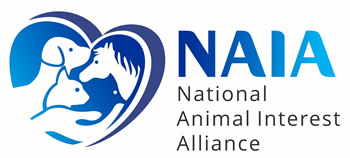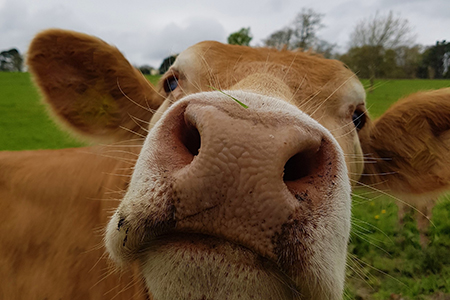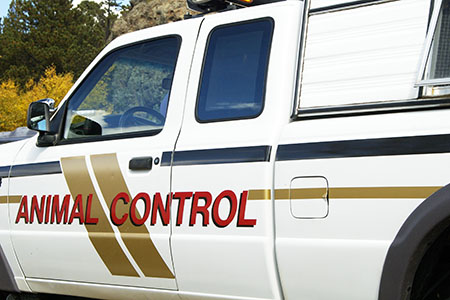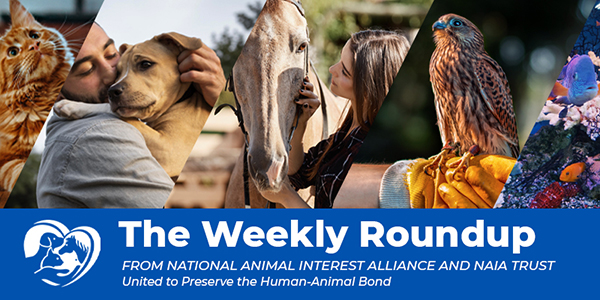
Inside This Issue:
- Botswana Threatens to Send 10,000 Wild Elephants to London over Proposed Hunting Ban
- Endangered Whooping Crane Chick Shot Dead after Release into Wild
- Transgenic Cow Produces Human Insulin
- Springtime Reminder: Leave Them Critters Be!
- Fulton County Animal Services to Atlanta: Pay up, or We Stop Taking Your Calls
Botswana Threatens to Send 10,000 Wild Elephants to London over Proposed Hunting Ban
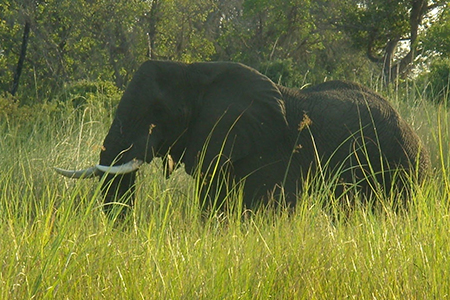
Wild bull elephant in Botswana. Photo: Vanessa Gange
Botswana is the elephant capital of Africa, boasting the largest population of Savannah elephants on the continent. With that comes an increase in human-elephant conflict - a term used to describe crop raids, motor vehicle crashes, building damage, and even the loss of human life. This is not just for human categories of damage and loss: wildlife authorities also use “conflict” to describe elephant deaths from poaching, injuries from deterrents, or poisoning.
For years Botswana allowed for legal means to hunt elephants. The purpose of this was to encourage the regulated taking of individual animals and their parts, to keep local economies afloat, and to keep people fed. It was outlawed in 2014, even though it wasn’t a popular local decision. Just a few years later, it was repealed due to a resurgence in human-elephant conflict.
Westerners often have a view of elephants as being endangered in all parts of the world, but this is not the full picture and definitely not the case in Botswana. The large numbers of elephants in Botswana not only impact the country’s human inhabitants, but the number has grown large enough to harm elephants, as well. Much like white tailed deer in the United States, elephants can eat themselves out of house and home, causing a domino effect of starvation throughout the animal kingdom.
Since the last CITES meeting in Panama, elephants have again become a hot topic. Western animal rights groups in the US and the UK are pushing to end all trophy hunting and culling of wild elephants, regardless of the well-known impacts unmanaged herds have on their surroundings.
This brings us to the most recent development out of Britain, where a bill to prohibit hunting trophies and the selling of hunting licenses is before Parliament. This has caused a major uproar in some African elephant range countries, including Botswana. In a heated discussion before the British Government officials from Botswana and neighboring Zimbabwe voiced their opposition to the bill and overall, opposition to the British government dictating how and what to do with their wildlife. To illustrate their point, Botswanan officials have threatened to send 10,000 wild elephants to London so Britons can “have a taste of living alongside elephants.”
It is important to point out that several of the South African countries’ economies heavily rely on ecotourism to generate income. Those activities cannot continue or flourish without responsibly managed wildlife. When foreign governments and entities like Humane Society International try to manage another country’s wildlife from afar, it is viewed as neocolonialism, and the palpable frustration of these countries – the countries where the animals actually live and come into conflict with people – is entirely understandable.
Furious Botswana officials threaten to send 10,000 elephants to London's Hyde Park 'so Brits can try living with them' amid hunting trophies row
Resources
★ Solving India’s deadly conflict between humans and elephants
★ NAIA: Lions and Tigers and Elephants, Oh My! (CITES 1997)
Endangered Whooping Crane Chick Shot Dead after Release into Wild
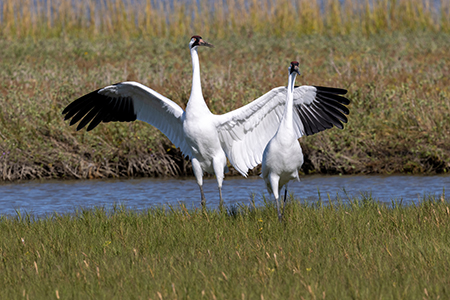
Two gorgeous whooping cranes at a wildlife refuge.
Many of you may remember the national efforts to save the Whooping Crane from extinction. The animal's population was decimated by habitat loss and unregulated hunting, bottoming out at only 15 specimens by the late 1930s. To come back from this nadir, the bird required captive breeding and habitat restoration, and it has experienced a lot of success. In the past 70 years the population of Whooping Cranes has grown to about 800 today – still dangerously low, but undeniably major improvement.
The Dallas Zoo prides itself on breeding animals for reintroduction to the wild. It has contributed to foreign birds like the Andean condor and domestic birds like the Whooping Crane. Which is why they are seeking answers for why one of the birds they reared from the International Crane Foundation was found shot dead in Louisiana. Because Whooping Cranes are federally protected birds, the Louisiana Department of Wildlife and Fisheries (LDWF) is working in conjunction with USFWS to investigate the bird’s death. This was the first Whooping Crane to hatch at the Dallas Zoo’s Whooping Crane Center of Texas, making the loss all the more painful for the folks who came together to collaborate for captive breeding and release programs. There is a reward of at least $12,500 for information leading to the arrest and indictment of whoever is responsible for the crane’s death.
Dallas Zoo, wildlife organizations investigate death of endangered crane chick found in Louisiana
Resources
★ These 'eggs' are spying on whooping cranes to boost survival
★ Whooping Cranes: Reflecting on 50 Years of ESA Protection and Habitat Conservations
Transgenic Cow Produces Human Insulin
In a story that is guaranteed to infuriate animal rights activists, terrify Luddites, and even make some of us normies cringe, it was revealed last week that there is a cow in Brazil whose milk contains human insulin. Yes, you read that right: human insulin.
This transgenic cow is the result of a team-up between American and Brazilian universities whose researchers are seeking ways to solve insulin shortages and lower the price of this life-saving hormone. And in this case, it’s working spectacularly: this particular cow creates massive amounts of insulin when compared to the current, industry-standard yeast and bacteria method of production.
Of course, this amazing cow is only one success. 10 cow embryos were injected with DNA, and in only one case did the insulin “take.” So even if transgenic cows are the future of insulin, the process needs to be refined, and “insulin farms” aren’t something we will be seeing in the immediate future. It is estimated that over 500 million people around the globe suffer from diabetes, and there are certainly many more on the way. Ideally, this disease would simply be prevented, but the current reality is that we need a lot more insulin, and soon!
A Herd of Genetically Engineered Super Cows May Just Solve the Insulin Crisis
Resources
★ World Diabetes Facts & figures
★ Biotech raises funds to find cancer treatments using transgenic mice
Springtime Reminder: Leave them Critters Be!
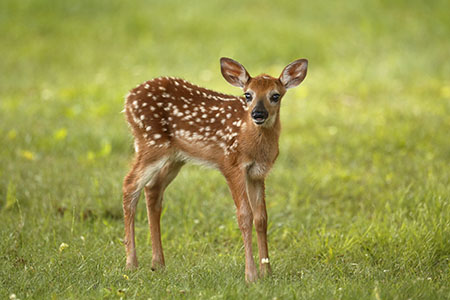
Don't panic. Mom is almost certainly nearby – we promise!
It's officially spring now, and you know what that means: time for our annual reminder to leave them critters alone! Wildlife doesn’t comport to our rules of modern parenting, so don’t call Child Protective Services on a doe who leaves her fawn alone in your backyard, and for the love of all that is good and holy, don’t try to save that “abandoned” fawn. It’s almost certainly not abandoned, and disturbing the animal, no matter how well intentioned, only creates problems for everybody.
In most cases, the mom is just away getting food for the young ones (and perhaps a breather for herself). Getting up in her young ‘uns business could scare her off and lead to babies that really are untended for too long! Further, your interest could alert hungry predators to the babies’ location. If you come across a wild animal that seems genuinely injured or sick, the best thing to do is take out your phone, take note and a few pictures, then contact an expert (your state’s department of wildlife or a wildlife rehabber) for guidance.
Public service announcement done. Now go outside and enjoy the weather!
Keep Wildlife Wild: What to do if you encounter baby wild animals this spring
Resources
★ Don't Adopt Wildlife
★ Subverted Expectations in Behavior: How Wild Animals Actually Responded to Our COVID Lockdowns
Fulton County Animal Services to Atlanta: Pay up, or We Stop Taking Your Calls
It’s a rough time in the world of animal services. Overhead costs have shot up, it is harder to find and keep volunteers and staff, and good luck scheduling veterinary care in a timely manner. Compounding these difficulties, pet owners are facing similar economic struggles and housing insecurity, and are surrendering their pets to these often overfull and understaffed municipal rescues at an increased rate.
But as stressed as animal services are in some places, imagine the cost to the public and animals – health, safety, even survival – if they didn’t exist at all? That’s the game of chicken Fulton County Animal Services (FCAS) is playing with the city of Atlanta right now: pay up, or we stop taking your citizens’ calls.
FCAS, despite increased costs and workload, has not received an increase in payment for its services in a half decade. When its contract expired last January, fourteen of the fifteen cities it serves agreed to a new, higher paying contract. All except for Atlanta, which, despite being responsible for over half the calls FCAS receives, feels the increased costs are too exorbitant.
While the city of Atlanta appears content to play the role of miserly villain, there are additional wrinkles in this staredown. FCAS is run by a nonprofit, LifeLine Animal Project, which has faced a fair amount of negative press over the last year: external auditing, euthanasia for space when intake went up, and shipping surplus animals out of state where they ended up with poorly vetted, unacceptable third parties. Whether these or other issues have led to any bad blood or reluctance to pay up is pure speculation, but for the sake of fairness and a fuller picture, they are worth mentioning.
If an agreement cannot be reached, county commissioners have unanimously agreed to stop responding to Atlanta by April 3rd, so the clock is ticking! Animal services are an underappreciated but vital part of keeping people, pets, and livestock safe and healthy, so hopefully this gets ironed out before then.
Fulton threatens to cut off animal control in city of Atlanta
Resources
★ DeKalb CEO says county may need to rethink no-kill policy at LifeLine animal shelter
★ Lifeline Animal Project working to rescue dogs from ‘illegal kennel operation’
Also in the News...
★ Leader of animal trafficking ring sent to prison following investigation by HSI Houston, federal partners (Spider Monkeys & Endangered Birds)
★ Surveillance video shows theft of 2 puppies from Colorado pet store (Pet Theft; Caught on Camera)
★ Nashville shelter takes in 33 animals rescued from Hermitage hoarding situation (A Quiet Case of Hoarding)
★ Harsh Mongolian winter leaves 4.7m animals dead; Red Cross issues appeal (Climate Change; Herding Crisis)
★ Two dogs revived, other animals dead after St. Augustine house fire (Fire & Safety; Revivals & Tragic Losses)
★ Here’s what to do if you see these 8 animals in North Carolina this spring, experts say (Springtime Lists; Please Don't Feed the Bears)
Click here to see what is happening legislatively
